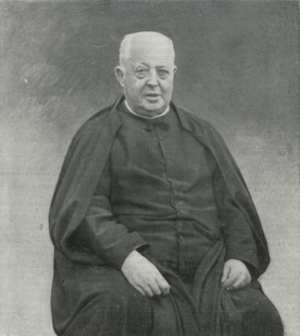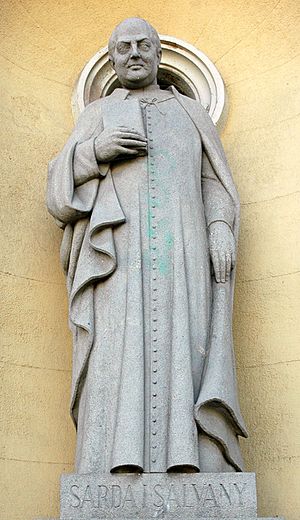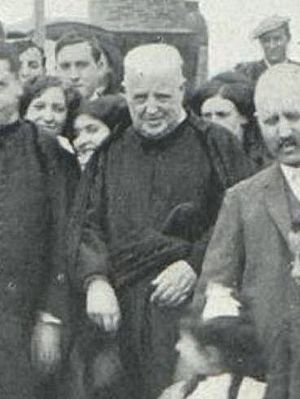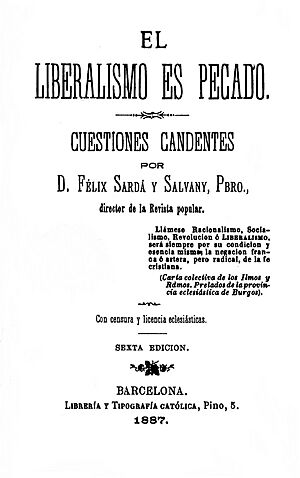Félix Sardà y Salvany facts for kids
Félix Sardà y Salvany (born May 21, 1844 – died January 2, 1916) was a Spanish Catholic priest and writer. He was born in Sabadell, a city in Spain. He was known for his work in helping others and for his many writings. Historian Roberto de Mattei said that Salvany was a popular priest. He was seen as a good example because of his strong beliefs and clear way of teaching.
Contents
A Popular Magazine Editor
For more than 40 years, Félix Sardà y Salvany was the editor of a weekly magazine called La Revista Popular. This magazine talked about all the important issues of the time. It looked at these issues from a Catholic point of view.
From 1907 to 1914, he also published a large collection of books. These included short books, pamphlets, articles, and talks. This collection was called Propaganda católica.
His Views on Liberalism
Salvany is most famous for his writings against Liberalism. Liberalism was a set of ideas about personal freedom and separating the Church from the government. These ideas came from a time called the Enlightenment.
Salvany believed that Liberalism was a serious sin. He thought it needed to be fought against. He wrote that Liberalism was completely wrong in its ideas. He also believed it caused complete disorder in the world. Because of this, he said it was a very serious sin.
Why He Wrote Against Liberalism
Salvany's writings against Liberalism became well-known after a big change in Spain. This was the liberal Revolution of 1868. This revolution led to the First Spanish Republic. This new government promised many things but also had problems.
Later, a military leader named Arsenio Martínez-Campos y Antón took control. He brought back the Spanish monarchy in 1874. This was called the Bourbon Restoration.
During the time between 1868 and 1874, the Catholic Church lost many of its special rights. It was no longer the official religion of Spain. In 1873, the Spanish Republic wanted to separate the Church and the government. They wanted Spain to be a secular state, meaning it would not be tied to any religion.
When the Bourbons came back, Catholicism became the official religion again. It got back its special rights over other religions. The Constitution of 1876 said Catholicism was the state religion. Other religions were allowed, but their activities had to be private.
Some people who supported the 1868 Revolution were against the Church or even against religion itself. This showed that many people were starting to feel distant from the Church. Some observers at the time noticed that many people, both educated and uneducated, felt the Church was losing its influence. They saw more people who were atheists or just didn't care much about religion. Church attendance also went down.
The Catholic Church itself had been trying to bring back strong religious feelings in Spain since the 1700s. They felt there was a "spiritual decay." Even though Spanish society was still religious, people were starting to question what it meant to be Catholic. This made it seem like the Church's power was weakening.
Salvany followed the ideas of Pope Pius IX. He spoke out against secularism and criticized liberals. He said that liberals were not true Catholics. People like Salvany, who wanted the Church and State to be very close, were called Integrists. They believed that Liberalism went against the idea of divine revelation. Even though they spoke loudly, the Integrists were a small group within the Spanish Church.
The Integrists were against the efforts of Antonio Cánovas del Castillo. He was a conservative who did not like religious freedom. But he tried to find a middle ground between conservatives and liberals. This upset the Integrists. Cánovas helped write the 1876 Constitution. The Integrists especially disliked Article 11, which allowed some tolerance for religious minorities.
Other people also tried to find a middle path between conservatives and liberals. These included Alejandro Pidal and Juan Mane y Flaquer. The Integrists wanted to keep spiritual matters separate from worldly things. They also faced disagreement from other Catholic clergy on how to mix faith with modern changes.
Critics of Salvany and the Integrists questioned their methods. They used new ways like mass-marketing and freedom of the press to share their message. Some saw this as using the very modern things they were fighting against. In 1884, Salvany also called for starting a Catholic political party. This again seemed to be using the system he was fighting against. He saw this call for a party as part of a "national crusade" for Spain.
His Famous Book: Liberalism is a Sin
Salvany's most famous book was El liberalismo es pecado. This means "Liberalism is a Sin" in English. He wrote it in 1884. The book has been printed many times. By 1960, a 20th edition came out in Spain.
See also
 In Spanish: Félix Sardá y Salvany para niños
In Spanish: Félix Sardá y Salvany para niños
 | Kyle Baker |
 | Joseph Yoakum |
 | Laura Wheeler Waring |
 | Henry Ossawa Tanner |





